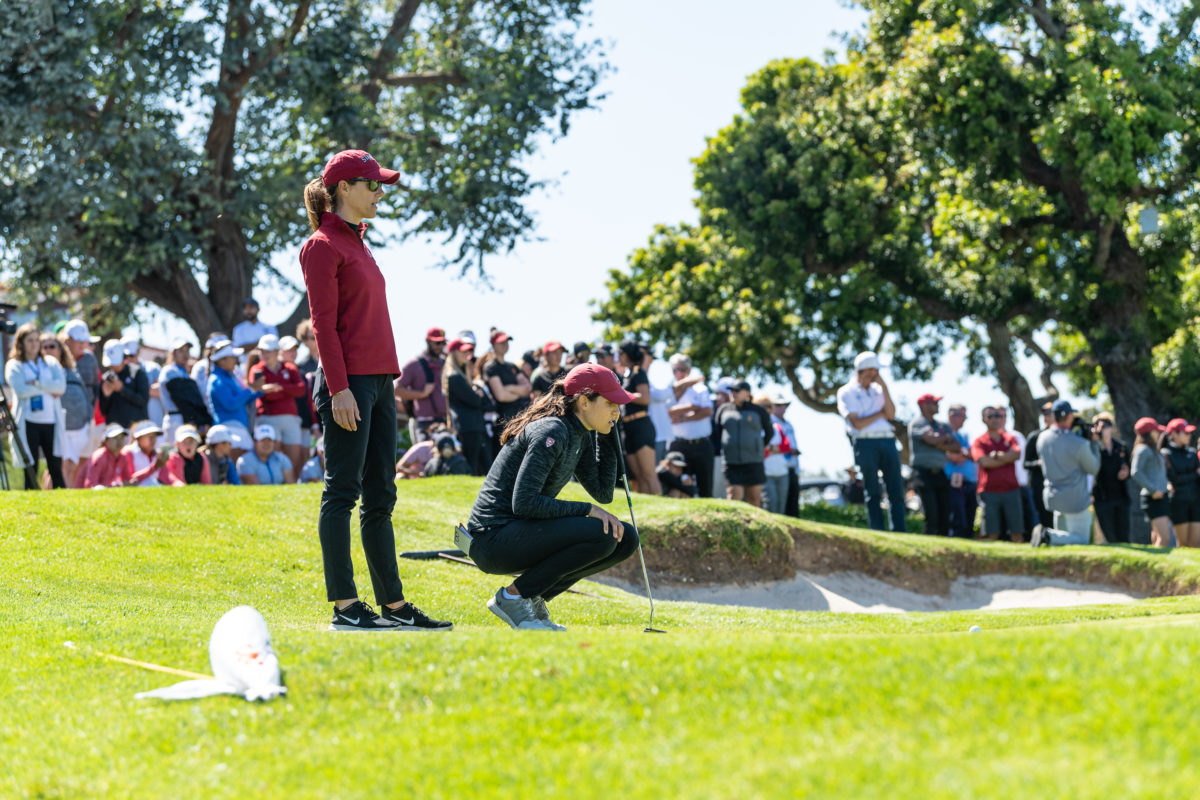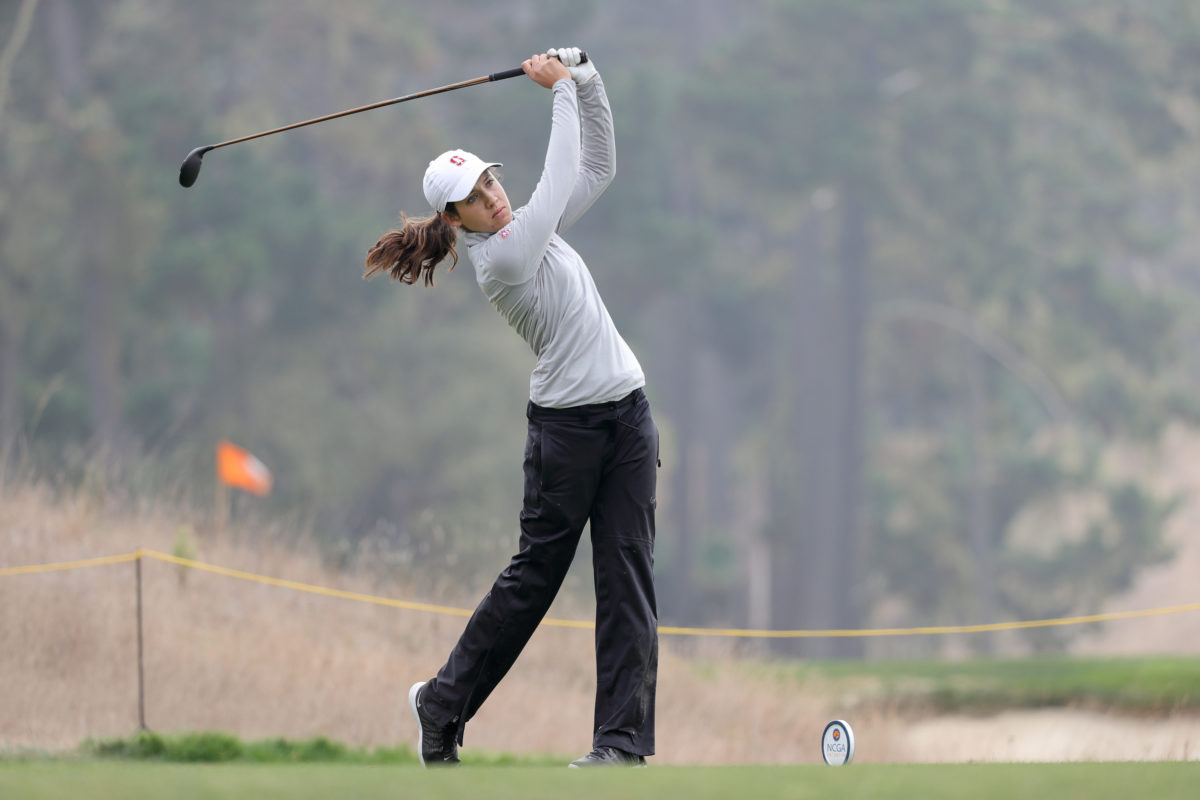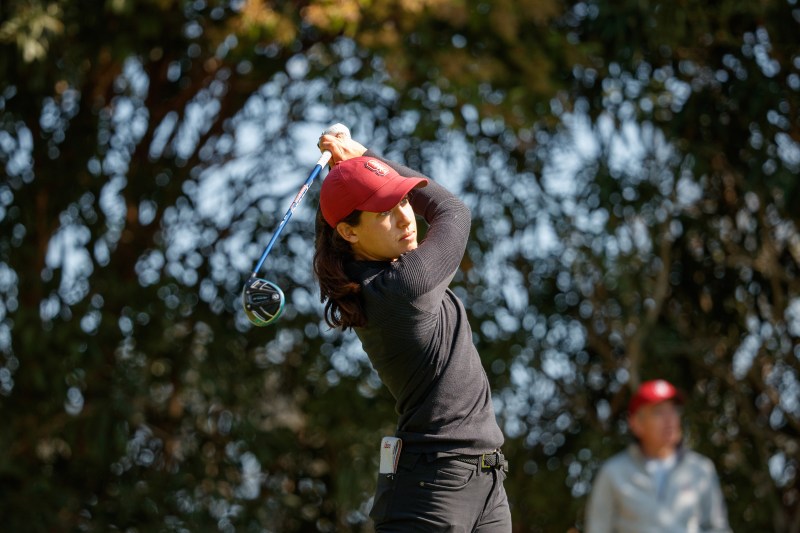The Evian Resort Golf Club sits among the foothills of the French Alps overlooking picturesque Lake Geneva. The city is best known, however, as host of the annual Evian Championship — one of five majors on the Ladies Professional Golf Association’s (LPGA) tournament circuit. The culture of high caliber golf certainly rubbed off on Stanford senior Albane Valenzuela, who grew up just 45 minutes from the lakeside resort.
At only 21 years old, Valenzuela is currently the No. 2 women’s player in the World Amateur Golf Rankings. She was Stanford’s first Pac-12 Women’s Golfer of the Year in 2018-19 and has an Olympic appearance under her belt. On Tuesday, Valenzuela announced her next chapter: a professional career with the organization she grew up idolizing.
In a statement on Nov. 12, Valenzuela shared her decision to forego the rest of her senior season on the women’s golf team and instead turn pro. Despite no longer representing Stanford on the course, she intends to remain enrolled as a student and graduate in the spring with a degree in political science.
“Playing professionally has always been one of my dreams, but it’s definitely challenging to combine both studies and golf and [to] pursue my aspirations at the same time,” Valenzuela said. “The fact that I wasn’t sacrificing academics for my aspirations [in turning professional] was really important to me.”
Valenzuela’s decision to turn pro was ultimately prompted by her aspirations to compete in the upcoming Olympics and a particularly strong performance at the 2019 LPGA Q-Series.
Golf was included in the 1900 and 1904 Olympics before being cut. It was reintroduced, however, in 2016 at the Rio Olympics due to increasing popularity. Valenzuela was part of Switzerland’s inaugural team before she arrived as a freshman on the Farm. Just one of three amateurs to qualify for the Olympics, she called the international sporting event “the best achievement for any athlete.” As the youngest golfer at the Olympics, she finished in 21st.
“Representing your country at that stage, I think there’s just no words to capture the emotions,” she said. “I still get goosebumps just thinking about when I walked into the stadium. You feel like you have the eyes of the world watching you, and you just realize the magnitude of the event.”

“It didn’t matter where you came from,” she added. “We were just all united for the love of the sport and the passion for what we’ve done and what you can bring to your country and your sport itself. It’s just so incredible.”
Valenzuela is still hungry for more, however, and hopes to return to the Olympics this summer with “less pressure” now that she is no longer an “underdog.”
A sixth place finish at the 2019 LPGA Q-Series in early November cemented her position as an up-and-coming star in the LPGA — despite the fact that the 2019 U.S. Women’s Amateur finalist entered the tournament in October “with no expectations.”
The Q-Series tournament is composed of three stages, with the first hosted in California in August. Valenzuela, along with teammate senior Andrea Lee, were exempted from the opening stage due to their collegiate and world rankings. Lee currently sits in third in the World Amateur Golf Rankings, one spot behind Valenzuela.
The second stage of the competition took place in Florida, where Valenzuela recalled that 200 girls competed for 30 sports. She excelled in the competitive atmosphere, placing in the top-10 to advance to the final portion of the tournament in North Carolina.
The final leg of the tournament includes two consecutive weekends of play with a four-day tournament on one course and a four-day tournament on another course. The event, which Valenzuela calls a “golf marathon,” combines scores from both days, meaning that the winners must be consistent.
“Getting that top-10 [finish] was huge for me,” she said. “That really prompted my decision [to go pro] as well. The outcome was more than anything I could have anticipated.”
Stanford’s Albane Valenzuela celebrates with her father after earning her LPGA card for 2020. She’ll have tremendous status. pic.twitter.com/4YlhvX0HjJ
— Beth Ann Nichols (@GolfweekNichols) November 2, 2019
College players that advance through the Q-Series may subsequently immediately join the LPGA Tour or delay turning professional until the end of June the following year. Valenzuela chose the former option and noted that there are professional advantages to turning pro earlier. One incentive is the additional time to reconcile logistics. No longer an NCAA athlete, Valenzuela noted that she must now deal with more media, think about sponsorships, plan for expenses and consider options for an agent and caddy.
“It’s kind of hectic,” she said. “It’s definitely a different setting, but it’s a transition I knew I had to take at some point in my career… Now I have to think about myself and my own brand and image.”
Valenzuela’s dream of playing professionally was in fact 18 years in the making. She first picked up a club when she was three under the tutelage of her father. At the time, she lived on a golf course in Mexico. A few years later, the Valenzuela family moved to Geneva, where she lived until coming to Stanford. She competes internationally for Switzerland and is currently the country’s top-ranked golfer.
“The [Evian Championship] is where my parents met, so my dad always wanted to take me there,” Valenzuela said.
In her first visit to the championship as an eight-year-old, she watched Paula Creamer, an American LPGA golfer who has been as highly ranked at No. 2 in the Women’s World Golf Ranking. Valenzuela cites Creamer, nicknamed “The Pink Panther,” as an early inspiration.
“[Creamer] was dressed all in pink, super girly, and my dad said look, ‘There’s a pink panther.’ ‘Oh wow, a pink panther!’” Valenzuela said. “In the end, she gave me one of her pink balls, and I was like, ‘Whoa, I just want to be exactly like that.’ I thought it was so cool to see all those girls playing golf and hitting the ball so far. That’s when I realized I wanted to consider the LPGA as the ultimate goal.”
Despite her excitement to fulfill her childhood dream, Valenzuela noted her reluctance to step away from the athletic community at Stanford.
“[Deciding to go pro] was tricky because leaving the team is really hard,” she said. “It’s like a family to me, and you never want to leave your family behind. But, I think for my career, this was the right time for me to make that decision and transition.”

Although, Valenzuela will no longer represent the Cardinal athletically, she will remain on campus for seven more months to attend classes, train and use Stanford facilities — although at different hours than team workouts.
“My coaches are super understanding, and we have professional golfers that came through the program and still use the facilities. That’s one of the perks of being a Stanford golfer — you still get to be really close to the program,” she said. “They really integrate professional athletes. It’s like a Stanford family.”
Stanford’s rich golf legacy was a factor that drew her to the Farm. She cites former Stanford player Tiger Woods as one of her biggest role models and “probably one of the best athletes that ever came out of [Stanford].”
“It was just amazing to watch him win the Masters last year after arguably one of the best comebacks in sports history. [The team and I] were all so pumped and excited,” Valenzuela said. “There’s definitely a pride in saying we’re the school that had Tiger Woods. He’s a model of perseverance and someone I definitely look up to for just how hardworking and disciplined he’s been in his career.”
Unlike Valenzuela, however, Woods did not complete his degree and left Stanford in 1996 after his sophomore year to turn professional.
Despite coming into her freshman year as an Olympian, she still felt many of the same pressures as any other freshman.
“I came in as a freshman not knowing really what I wanted [at Stanford],” Valenzuela said. “I think it’s an intimidating place, too. You see all these people that are super successful, high achievers — like entrepreneurs that create their own startups.”
“I started to find my place and [learn] why I belong to this place,” she added. “After three years, I understand why I was meant to come to this school.”
The transition to college was made a little harder for Valenzuela due to the fact that she was nearly 6,000 miles from home, but she credits her team for making her feel at home. The Cardinal team also features another international player, senior Ziyi Wang from Beijing, China.
“I think [the transition to college is] hard when you come in as a regular student,” she said. “A lot of people rush, and a lot of people try to find their own fun group. I was given a friend group, and I think that once you’re part of a team, it’s a little bit more than friendship. You have also the competitive aspects; you go through the highs and lows.”

With just nine other golfers on the roster and competition from September to May, the women’s team is especially close.
Despite turning professional, Valenzuela is still a big advocate for collegiate athletics.
“I don’t think there’s any better place to learn what teamwork looks like than a college team environment,” she said. “You have to make sacrifices for your teammates. You cannot show up to workouts with a frowny face. It’s definitely a great learning experience, but also something I’ll miss because [my teammates are] great people — arguably some of the best people that I’ve ever met. Just seeing their faces every day and their energy and how pumped they are to tee it up.”
“Wearing ‘Stanford’ and knowing that you have the entire Stanford community cheering for you is definitely something I’ll miss, but I’m fortunate to have experienced it already,” she added.
Valenzula credits a lot of her collegiate success to Anne Walker, the Margot and Mitch Milias Director of Women’s Golf, who Valenzuela argues is the best head coach in the country. Walker has held the position since 2012 and has guided the Cardinal to an NCAA Championships berth every year.
Valenzuela said that Walker was sad to hear of her departure but was also the first person to call to congratulate her. Despite not being on the team anymore, Valenzuela said that they still talk every day.
“[Walker] would say, ‘You made the right decision. I know this is hard, but I will always be your friend.’ That means a lot,” Valenzuela said.
Moving forward, Valenzuela still hopes to remain an active member of the Stanford team, despite not being able to compete.
“I’m still going to see [the team] all the time. They’re all some of my best friends, so I think that won’t really change … Hopefully, I’m still in their group chats,” she said with a laugh. “I’m so pumped for them for next season. I will be their first cheerleader and fanatic.”
Contact Cybele Zhang at cybelez ‘at’ stanford.edu.
